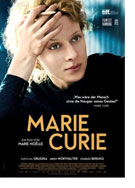

Opening 1 Dec 2016
Directed by:
Marie Noelle
Writing credits:
Marie Noelle, Andrea Stoll
Principal actors:
Karolina Gruszka, Arieh Worthalter, Charles Berling, Izabela Kuna, Malik Zidi
This high-profile Polish, French and German co-production by French director Marie Noëlle (Ludwig II) reveals six years of Marie Curie's academic struggle but above all shows the lesser-known personal life of this extraordinary women.
The birth of her daughter hardly interrupts Marie's working routine. Together with her husband Pierre Curie, a French physicist, she spends long hours in their makeshift laboratory. The two are totally devoted to each other and share the same interest in science research. In 1903 their dedicated efforts are rewarded when they receive the Nobel Prize for the discovery of radioactivity. This makes Marie Curie the first woman to receive a Nobel Prize. Both welcome the financial relief coming with the award, but the new publicity is disturbing their privacy.
Three years later Marie's life is turned upside down with the sudden death of Pierre, who is killed in a road accident. She is devastated but determined to carry on with their mutual project. As a woman on her own she faces tough male competitors in her struggle for recognition. Discussing the newest discoveries with Albert Einstein is a rare exception. Through stubborn tenancy and tireless work she eventually is appointed the first woman professor at the Sorbonne University.
Her long-time colleague Paul Langevin is a great help and support. He not only admires her innovative mind but falls in love with this charismatic woman. After years of sorrow she is surprised to find love again. Unfortunately, Langevin is already married, and their relationship arouses a veritable scandal when his jealous wife informs the “yellow” press. Tension runs high as the gossip reaches the officials in Sweden just when Marie Curie is about to receive her second Nobel Prize in 1911. She travels to Stockholm together with her teenage daughter Irène. In her speech at the ceremony Marie Curie dedicates the Nobel Prize to her deceased husband. The film ends with daughter Irène walking directly behind her mother suggesting “walking in her steps” into the future.
Marie Noëlle, who wrote the script together with Andrea Stoll, succeeds in showing the various facets of the ambitious scientist, the soft-hearted mother and the passionate lover. Polish actress Karolina Gruszka copes superbly with her challenging role as Marie. This fascinating biopic is believed to be the first big-screen film featuring Marie Curie since the classic black-and-white Hollywood version of 1943, apart from various TV episodes and a BBC documentary.
In Poland, her country of birth, Marie Sklodowska-Curie remains a national heroine and role model. In France she is the first woman interred in the Paris Pathéon accredited for her own achievements. (Birgit Schrumpf)